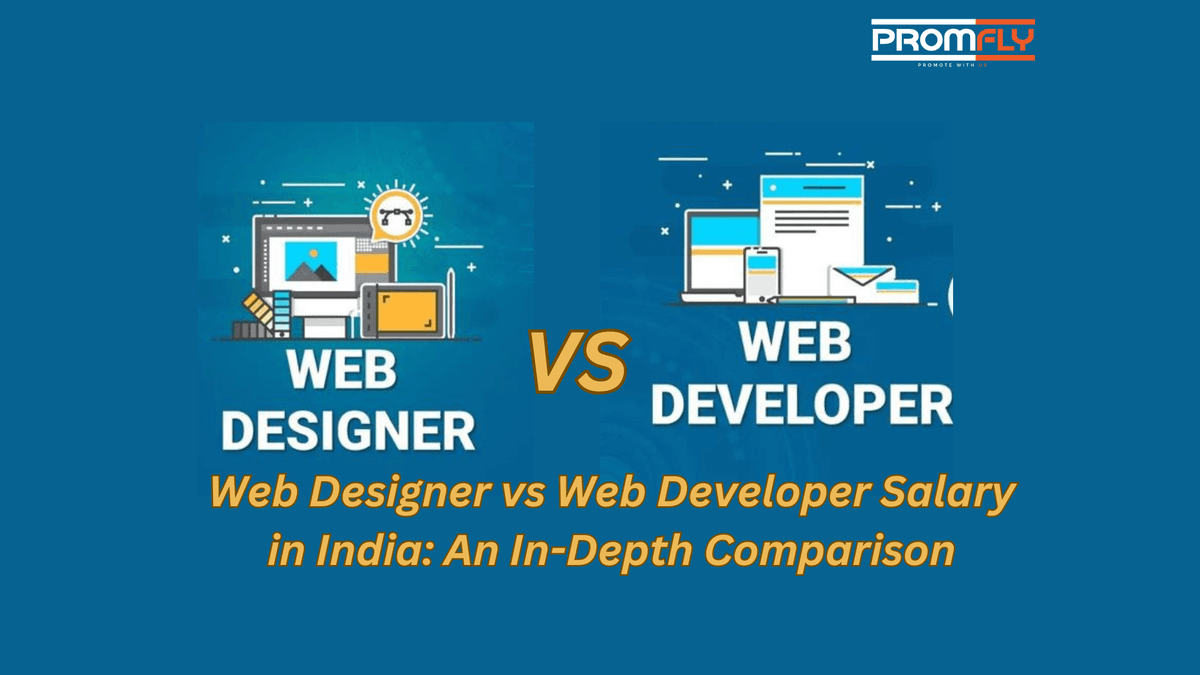

Web Designer vs Web Developer Salary in India: An In-Depth Comparison
Published: 2025-09-20 07:46:29
The digital landscape in India has been evolving rapidly, driven by the rise of online businesses, mobile apps, e-commerce platforms, and more. As a result, the demand for skilled professionals in the web industry has surged. Among the most sought-after roles are web designers and web developers. While both play essential roles in the creation of a website or web application, the skill sets they require, their responsibilities, and their salaries can differ significantly.
Understanding the Roles: Web Designer vs Web Developer
In this article, we will delve into the Web Designer vs Web Developer salary landscape in India, explore the key differences between the two roles, and provide insights on career growth, demand, and job opportunities.
Who is a Web Designer?
A Web Designer focuses on the visual aspects of a website. They are responsible for designing the layout, user interface (UI), user experience (UX), and overall aesthetics of a website. Web designers work closely with stakeholders to ensure the design aligns with the brand identity and user expectations. The core skills of a web designer include:
- Graphic Design: Knowledge of design software like Adobe Photoshop, Illustrator, and other design tools.
- UI/UX Design: Creating user-friendly interfaces and ensuring a positive user experience.
- Responsive Design: Ensuring the website looks good on all devices and screen sizes.
- HTML & CSS: Basic knowledge of HTML and CSS for designing web pages.
- Prototyping and Wireframing: Using tools like Sketch, Figma, or Adobe XD to create website wireframes and prototypes.

Who is a Web Developer?
On the other hand, a Web Developer is responsible for turning the design into a functional website. They write the code that makes the website interactive and dynamic. Web developers can be categorized into three main types: front-end developers, back-end developers, and full-stack developers. Here's a brief overview of their roles:
- Front-End Developer: Focuses on the client side of the website, i.e., what users see and interact with. They use languages like HTML, CSS, and JavaScript to build the visual components of the site.
- Back-End Developer: Works on the server-side, creating databases, server scripts, and APIs that handle data and functionality.
- Full-Stack Developer: Combines the roles of both front-end and back-end developers, handling both the visual and functional aspects of a website.
Key skills for a web developer include:
- HTML, CSS, and JavaScript: Core languages for building websites.
- Frameworks and Libraries: Familiarity with frameworks like React, Angular, or Vue.js for front-end development and Node.js or Django for back-end development.
- Version Control Systems: Knowledge of Git for code management.
- Database Management: Understanding of databases like MySQL, PostgreSQL, or MongoDB.
- Problem-Solving: Ability to troubleshoot and debug code.
know about: Why Our Website Development Services Are the Best for Your Business Growth
Web Designer vs Web Developer: Salary Comparison in India
While both web designers and web developers play crucial roles in the development of a website, their salaries in India can vary based on factors such as experience, location, skill set, and industry demand.

Average Salary of a Web Designer in India
The salary of a web designer in India depends on various factors, including their experience level and the complexity of the projects they handle. On average, a web designer can expect the following salary ranges:
- Entry-Level Web Designer (0-2 years experience): ₹2.5 - ₹4.5 Lakh per annum
- Mid-Level Web Designer (3-5 years experience): ₹5 - ₹8 Lakh per annum
- Senior Web Designer (5+ years experience): ₹9 - ₹15 Lakh per annum
Salaries can vary significantly depending on the city, with web designers in metro cities like Bangalore, Delhi, Mumbai, and Hyderabad earning higher salaries compared to smaller cities. Additionally, web designers with expertise in UI/UX design or those working with top-tier design agencies may earn higher salaries.
Average Salary of a Web Developer in India
Web developers, especially those with specialized skills, tend to earn higher salaries than web designers. As web development requires a broader and more technical skill set, the salary expectations for developers are generally higher. Here’s a breakdown of the average salary for web developers in India:
- Entry-Level Web Developer (0-2 years experience): ₹3.5 - ₹6 Lakh per annum
- Mid-Level Web Developer (3-5 years experience): ₹6 - ₹12 Lakh per annum
- Senior Web Developer (5+ years experience): ₹12 - ₹20 Lakh per annum
Full-stack developers and those with expertise in advanced technologies like artificial intelligence (AI), machine learning (ML), or blockchain can command even higher salaries. In comparison to web designers, web developers typically earn more due to the technical nature of the work and the demand for developers across various industries.
Factors Affecting Web Designer vs Web Developer Salaries
Several factors impact the salary of web designers and web developers in India. Understanding these can help individuals make informed decisions about their careers.
- Location: Cities like Bangalore, Mumbai, and Delhi have a higher cost of living and more job opportunities, leading to higher salaries for both web designers and developers. Smaller cities or towns may offer lower salaries, but the cost of living is typically also lower.
- Experience: Experience plays a significant role in determining salary. Entry-level professionals in both fields earn less compared to those with several years of experience. Senior professionals with specialized skills can command significantly higher salaries.
- Skill Set: Web developers with knowledge of advanced programming languages, frameworks, and tools such as React, Angular, Node.js, Python, and Ruby on Rails often earn higher salaries than those with basic knowledge of HTML, CSS, and JavaScript. For web designers, expertise in UX/UI design, animation, and familiarity with tools like Adobe XD, Figma, and Sketch can lead to better-paying opportunities.
- Industry and Company Size: Large tech companies, startups, and digital agencies often pay higher salaries. Industries like e-commerce, fintech, and SaaS have a high demand for both web designers and developers, which can lead to competitive salaries.
- Freelancing vs Full-Time Employment: Freelancers in both fields may have the potential to earn higher hourly rates, but their income can be less predictable. Full-time employees in stable companies often receive benefits such as health insurance, paid leave, and job security, which may not be available to freelancers.
Web Designer vs Web Developer: Job Outlook and Career Growth
The demand for both web designers and web developers is expected to continue growing in the coming years. The increasing need for businesses to establish an online presence, the rise of e-commerce, and the growth of web and mobile app development contribute to the robust demand for these professionals.
- Web Designer Career Growth: As a web designer gains experience, they may transition into more senior roles such as UI/UX Designer, Visual Designer, or Art Director. With additional skills, designers may also move into areas like product design or become consultants for companies looking to enhance their web presence.
- Web Developer Career Growth: Web developers have more opportunities for specialization. For example, front-end developers may transition to full-stack development, while back-end developers can move into roles like DevOps or become experts in server management and database design. Developers also have the potential to work in emerging fields such as blockchain development, AI, or cybersecurity.

Frequently Asked Questions (FAQs)
1. What is the difference between a web designer and a web developer?
A web designer is responsible for the visual aspects of a website, focusing on layout, design, and user experience. A web developer, on the other hand, is responsible for writing the code that makes the website functional, including front-end and back-end development.
2. Which job pays more in India, web designer or web developer?
On average, web developers earn higher salaries than web designers in India due to the more technical nature of their roles. Full-stack developers, in particular, command high salaries.
3. Can a web designer become a web developer?
Yes, many web designers transition into web development by learning coding languages such as HTML, CSS, JavaScript, and various development frameworks. This transition can lead to higher-paying job opportunities and career growth.
4. What skills do I need to become a web designer or developer?
For web designers, essential skills include graphic design, UI/UX design, and knowledge of design tools like Photoshop and Figma. Web developers need proficiency in programming languages (HTML, CSS, JavaScript) and frameworks like React or Node.js, along with problem-solving skills.
5. Which career is better: web designer or web developer?
Both careers offer excellent opportunities. If you prefer focusing on creativity and design, a career in web design may be ideal. If you enjoy coding and solving technical problems, web development might be a better fit.
6. What is the job outlook for web designers and developers in India?
The demand for both web designers and developers is expected to grow as businesses continue to digitize. Developers, especially full-stack developers, are in high demand. Web designers with UI/UX skills will also continue to be sought after.
Summary
Choosing between a Web Designer vs Web Developer career largely depends on your interests and strengths. While web designers focus on the creative and visual aspects of websites, web developers handle the technical side, ensuring that the site functions properly. Both roles offer promising career paths with competitive salaries, and there is ample opportunity for growth in both fields.
Understanding the salary differences, career prospects, and skill requirements will help you make an informed decision as you pursue a career in the web industry.
Read also: 20 Must-Have Features for a Business Website



